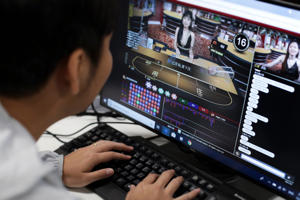- China’s envoys in Manila, local Filipino-Chinese community concerned about Chinese women reportedly being targeted in gambling-related kidnappings
- Many such incidents typically go unreported and victims are often reluctant to cooperate with police, fearing further threats
Chinese women are reportedly being targeted in a new wave of gambling-related kidnappings in the Philippines, to the alarm of Beijing’s envoys in Manila and the local Filipino-Chinese community.
The Chinese embassy on Monday asked Philippine authorities, after it had “checked and verified the specific cases … to protect the legitimate rights and interests of Chinese citizens in the country”, the Philippine Daily Inquirer reported.
The victims are “Chinese females mostly, and recently (also) Cambodian and Vietnamese”, said Teresita Ang-See, founding chairman of the Movement for the Restoration of Peace and Order (MRPO), an organisation established in 1993 to combat rampant kidnappings of Filipino-Chinese.
Do you have questions about the biggest topics and trends from around the world? Get the answers with SCMP Knowledge, our new platform of curated content with explainers, FAQs, analyses and infographics brought to you by our award-winning team.
Filipino-Chinese were typically targets of kidnappers as they were perceived to be relatively wealthy. MRPO added that women were primarily targeted as the perpetrators considered them “more manageable”.

© Provided by South China Morning Post A screen shows Oriental Game, licensed to run an online gambling website in the Philippines, which has a live platform on its website for customers to interact with the young, female Chinese dealers. Photo: SCMP
MRPO said its “record” showed that at least five snatchings took place each month from January to August this year, or 40-48 cases that were related to the Philippine Offshore Gaming Operators (POGOs) industry.
But Ang-See said there was so far “no basis” that 56 abductions had taken place “in the last 10 days”, as claimed on September 5 by Lugene Ang, head of the Philippine Chinese Chamber of Commerce and Industry, during an appeal for help in Congress.
“The 56 cases were from a WeChat post but no incidents (were) cited,” Ang-See said.
However, she also pointed out that if they were to include human trafficking cases of women, students and workers enticed to work in POGOs, these “could be in the hundreds”.
Philippine police say they killed kidnap suspects who abducted Chinese man
Philippine National Police (PNP) Director General Rodolfo Azurin Jnr initially dismissed the rise in kidnappings as “fake news”, since the police had only officially recorded 27 kidnapping “incidents” this year, of which only 15 were POGO-related.
But he changed his tune on Monday and held a press conference, saying “reports of POGO-related kidnapping of foreigners by fellow foreigners, remain to be a concern for the PNP, not only because it violates Philippine laws, but more so because it does not fit well with the country’s desire to establish the Philippines as an international tourist destination and investment haven for foreign capital”.
To complicate the matter, many kidnap victims have refused to cooperate with local authorities over fears of revealing their gambling activities to the Chinese government, and the possibility that law enforcement officers might have been involved in their abduction.
“Police authorities’ hands are tied because rarely do victims report the cases to them,” MRPO said in a September 7 statement, which noted that both the PNP chief Azurin Jnr and the new PNP Anti-Kidnapping Group Director Rodolfo Castil Jnr were veterans in resolving kidnapping cases.

© Provided by South China Morning Post According to a source, the biggest ransom payment since the 1990s had occurred during Rodrigo Duterte’s presidency. An online gaming operator had paid 70 million yuan (at the time equivalent to 419 million pesos, or US$7.3 million) in exchange for the release of his son who had been held hostage for months. Photo: AP
“We have incidents where victims were rescued and cooperated to file complaints. But, after a week, they retracted and withdrew their complaint because they were paid off and/or threatened,” the group added.
MRPO chairman Ka Kuen Chua said his group has tried to encourage victims to testify, to avoid the situation in the early 1990s when kidnappings were common, cases were unreported and victims’ families paid large ransoms quickly.
Founding MRPO chair Ang-See also added that when victims’ families pay large ransoms quickly, it “encourages more and more kidnappings and shows that crimes pay and pay lucratively”.

Replay Video
Separately, a source who asked not to be named told This Week in Asia that the biggest ransom payment since the 1990s had occurred during Rodrigo Duterte’s presidency. An online gaming operator had paid 70 million yuan (at the time equivalent to 419 million pesos, or US$7.3 million) in exchange for the release of his son who had been held hostage for months.
The source said incumbent Senator Ronald “Bato” Dela Rosa, who was the PNP chief then, knew about this ransom payment.
Ransom payments these days, which were previously made from legitimate bank accounts in China, are made through black market remittance centres given strict government policies on remittances and money laundering, MRPO president Chua said.
Victims include workers or gamblers who accumulate debt and are held hostage by the casino or their employers. Some victims are turned over to syndicated collectors who may belong to criminal rings. These victims are tortured and threatened while their families in China are extorted, Chua said.
‘Las Vegas of Asia’: can Macau forge an identity without casinos and gambling?
He also noted that after Cambodia had cracked down on gaming, some criminal syndicates found “safe haven” in Manila. These kidnappers often have a wide network beyond China and Asia, extending to Europe, he said.
“It is also true that many of the recent victims are females. Many of them are victims of human trafficking after they were promised jobs here and ended up in casinos and/or in prostitution. The rest of the stories are false and exaggerated, some are even videos of old,” he added.
The Chinese embassy has reminded its nationals in Manila that gambling remains a crime in the mainland and they should therefore “keep away from immoral activities, stay away from online gambling and telecommunications fraud, and avoid falling into gambling-related blackmailing and injury cases”.
More Articles from SCMP
Former Hong Kong police officer convicted of sex offences against his son
Preparing future leaders with innovation and compassion
This article originally appeared on the South China Morning Post (www.scmp.com), the leading news media reporting on China and Asia.
Copyright (c) 2022. South China Morning Post Publishers Ltd. All rights reserved.